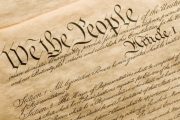
Podcast: Play in new window | Download ()
Subscribe: Android | RSS | More
President Joe Biden’s executive orders in his first several days have set a record. He has issued 25 of them already, more than either of his two immediate predecessors — Donald Trump and Barack Obama — and far more than George W. Bush and Bill Clinton before them. Ronald Reagan issued none during the same time span.
Some of the executive orders are quite significant, such as nixing Trump’s decision to take the United States out of the World Health Organization (WHO), reinstituting U.S. participation in the Paris Climate Agreement, and an order to prevent “discrimination” on the basis of “gender identity.” Transgender individuals who are biologically male but identify as female can use the same showers as female, for example, under the edict issued by Biden.
The “Mexico City” policy, first implemented by Reagan, is an executive order stating that no U.S. funds can be used by any international organization that provides abortion services. This was reversed by Clinton, then reversed back to the Reagan policy by Bush in 2001. Obama reversed the policy again in 2009, only to have Trump change back to Reagan’s initial policy in 2017.
Not surprisingly, Biden, who has completely capitulated to the pro-abortion side of the public debate, has reversed the Mexico City policy again, so as to allow U.S. funding for abortion in other nations.
Other executive orders by Biden were to require the counting of persons who are in the country illegally; reinstate the nuclear agreement with Iran, first adopted by Obama; require mask-wearing by the federal workforce and on federal property (of course, Biden and his family did not follow this order themselves, while they were “celebrating” his inauguration); cancel the Keystone XL pipeline and ban fracking on federal lands; and reform the incarceration system to eliminate the use of privately operated criminal detention facilities.
Biden’s prolific use of executive orders so early in his administration has opened up a debate on the proper use of such orders. During the campaign, Biden said there are “things you can’t do by executive order unless you’re a dictator.”
As a general rule of thumb, Biden is quite correct. There are times that an executive order is within a president’s constitutional authority, and there are times that such orders are not within his range of constitutional authority. The Constitution gives all executive authority to one person — the president of the United States. Executive authority is the power to enforce federal laws. As such, it is not only reasonable but imperative that a president be able to issue some executive orders.
The Constitution requires the president to make sure the laws are “faithfully executed.” Obviously, no individual is able to do this on his own. We would not expect the president to hand out speeding tickets in national parks, for example. The orders that a president issues are to persons in the executive branch of the federal government. It is commonly said, incorrectly, that when we elected the president we are deciding “who is going to be running the country for the next four years.” The president had no such authority to “run the country” under the Constitution. He has no more authority to tell a private citizen what to do than I do. His executive orders are to those who work in the executive branch — the president runs the executive branch of the federal government, not the country.
Similarly, the president is the commander-in-chief, but only of the U.S. military, not the general public.
When the president issues an executive order, he is limited to carrying out functions required of him by the Constitution, or to carry out a law passed by Congress. Only Congress can make law, according to Article I of the Constitution. The president does not constitutionally “make law,” any more than a federal bureaucrat can legally make law. Federal judges do not make general law, either, but only the law for the case before them in their court.
The U.S. Supreme Court has rightly held that all executive orders made by the president must be supported by the Constitution in order to be legal. For example, only Congress can declare war — constitutionally. Once a war is declared, it is the president’s role as commander-in-chief of the armed forces to execute that declaration of war.
Looking at a few of Biden’s executive orders, we can safely assert, then, that some of the orders are unconstitutional. Take the decision to put the United States back into the Paris Climate agreement. The United States became part of it due to a decision made by President Barack Obama. But the Constitution requires any agreement with foreign powers — a treaty — to be agreed to by a two-thirds vote or more by the U.S. Senate. Obama had no legal right to put the United States into the Paris deal without that two-thirds vote from the Senate, and President Donald Trump did the right thing, both constitutionally and as a wise policy matter, to withdraw from it. Biden’s executive order to rejoin the Paris deal, without the approval of the Senate, is just as illegal as when Obama initially joined it.
For that matter, Trump’s USMCA trade deal was clearly a treaty as envisioned by the Founding Fathers, and it should have been placed before the U.S. Senate for their debate — requiring a two-thirds, not just a simple majority, vote.
Another executive order by President Barack Obama that was clearly unconstitutional was his Deferred Action for Childhood Arrivals (DACA) immigration order. It was an order issued not to faithfully execute federal immigration law, but in defiance of it.
In short, when a president issues an executive order, it should be for the purpose of carrying out constitutionally enacted laws of the Congress. It should never be used by a president to make law out of whole cloth.
Certainly, there are times when a president would like to simply make a law via executive order, to enact some policy that he truly believes would be a wise and prudent policy. But as George Washington said in his Farewell Address, “But let there be no change by usurpation; for though this in one instance may be the instrument of good, it is the customary weapon by which free governments are destroyed. The precedent must always greatly overbalance in permanent evil any partial or transient benefit which the use can at any time yield.”




